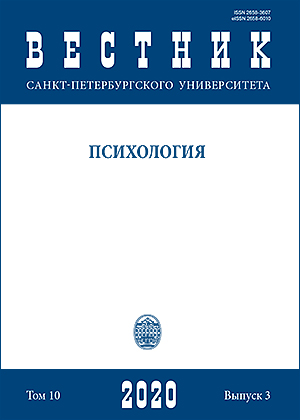University student’s HIV awareness and subjective risk assessment
DOI:
https://doi.org/10.21638/spbu16.2020.308Abstract
The article presents the results of a study of factors associated with the risk of HIV infection among young people in St. Petersburg. The research was conducted using the crosssection method in the period from 2016 to 2019, and 1,256 people participated from ages 17–26 years old. Using a structured interview, data was obtained from participants’ answers on their awareness of HIV. The interview was aimed at revealing the subjective risk amongst young people and learning how they perceive HIV can be transmitted. The interview also looked at how HIV can be avoided, i. e, using a condom during sexual contact, abstinence, refusal of intravenous drugs, etc. An assessment was made of the various methods of avoiding HIV and correlation between the factors. The analysis of the data demonstrated that the level of student awareness on the topic of HIV is relatively high at 75.6 % and it did not change significantly throughout the four years of the study. The number of students that associated themselves at risk is 31.5 %, therefore 68.5 % did not consider themselves at risk. These numbers also did not significantly change throughout the study. 51 % of students practice behaviour that excludes the main risks of HIV transmission, which include the above mentioned; no intravenous drugs, no sexual contact, using condoms, etc. The remaining 49 % did not carry out sufficient behaviours to keep infection rates to a minimum, 22.5 % of the these participants did not confirm the use of condoms for every sexual encounter; 25.5 % of the people who did not confirm if they use condoms for every sexual act, said that they do not use condoms as they have one regular partner. The study did not demonstrate significant statistical correlation between the level of HIV awareness and behavioural practices for avoiding transmission. This suggests the need to build a more complex research model, to formulate broader prevention tasks, including not only information, but psychological components — the impact on a personal assessment of the risk of infection and on specific behavioural risk patterns.
Keywords:
HIV infection, awareness on the topic of HIV, subjective risk of transmission, prevention target groups
Downloads
References
https://doi.org/10.21638/11701/spbu16.2018.205.
References
Downloads
Published
How to Cite
Issue
Section
License
Articles of "Vestnik of Saint Petersburg University. Psychology" are open access distributed under the terms of the License Agreement with Saint Petersburg State University, which permits to the authors unrestricted distribution and self-archiving free of charge.




